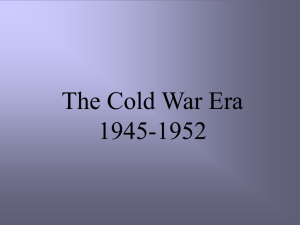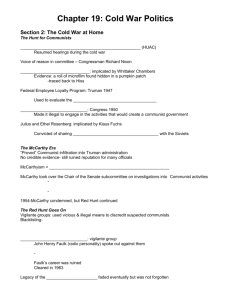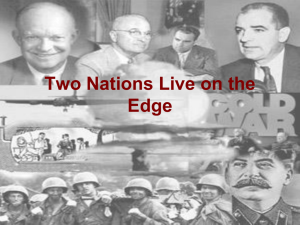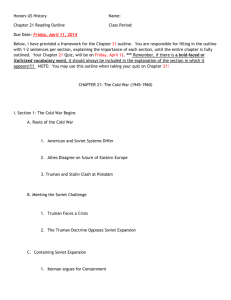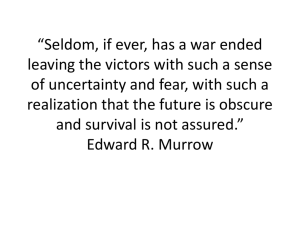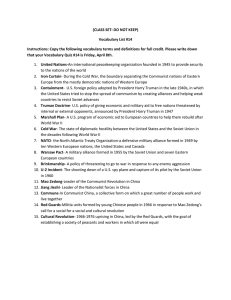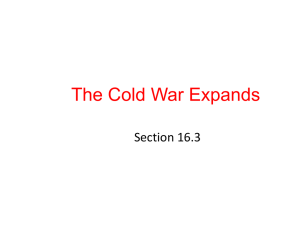The Cold War - Cal State LA
advertisement
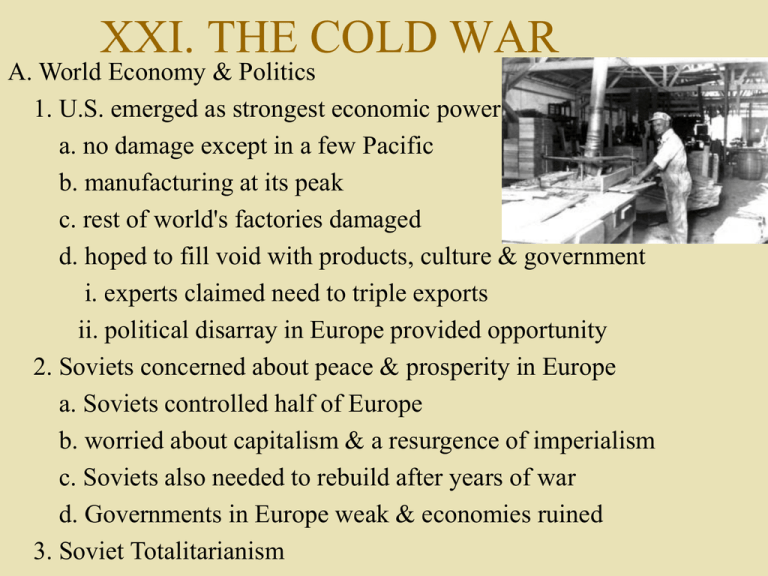
XXI. THE COLD WAR A. World Economy & Politics 1. U.S. emerged as strongest economic power a. no damage except in a few Pacific b. manufacturing at its peak c. rest of world's factories damaged d. hoped to fill void with products, culture & government i. experts claimed need to triple exports ii. political disarray in Europe provided opportunity 2. Soviets concerned about peace & prosperity in Europe a. Soviets controlled half of Europe b. worried about capitalism & a resurgence of imperialism c. Soviets also needed to rebuild after years of war d. Governments in Europe weak & economies ruined 3. Soviet Totalitarianism a. Americans distrusted Soviets & equated with Fascism b. Truman grew impatient waiting for elections in Poland c. 6 days after V.E. day stopped Lend-Lease i. Soviets depended on aid to rebuild ii. Stalin asked for $6 million loan a. Roosevelt wanted concessions but died b. Stalin asks for only $1 million from Truman c. Truman agree if Soviets lift trade restrictions d. Stalin looked elsewhere to finance rebuilding d. 1946 Stalin-communism & capitalism on collision course i. started building Soviet military at cost to society ii. Winston Churchill's Iron curtain speech Fulton, Mo. e. George F. Kennan-U.S.Chargé d'affaires in Soviet Union i. claims Stalin's hostility from neurotic insecurity a. no concessions would help situation f. Soviet influence growing i. 2/1947 Soviet negotiated Dardanelles with Turkey ii. U.S. feared communist revolution in Greece a. communist fighting against right wing monarchy 4. Truman Doctrine proposed 5/12/1949 a. congress afraid of giving aid & upsetting economy b. Truman claims U.S. must support free people c. Congress gives $400 million to Turkey & Greece d. Truman Doctrine proposes the U.S. to police world 5. Marshall Plan (Secretary of State George Marshall) a. Summer 1947 European conference on recovery & aid i. Soviet sent representatives but withdrew quickly a. plan called for free elections b. 1947 rigged Hungry elections eliminate opposition c. Kept Czechs in control with Soviet troops b. U.S. gives aid to west Europe & helps rebuild Germany i. Germany divided in four sections ii. U.S. & Britain join their sections a. they give German's charge of governmental duties b. France fears resurgence of Germany c. Soviets fear everything 6. Berlin Crisis 1948 a. Soviets strengthen boundaries against U.S. influence b. Berlin lies within Soviet section of East Germany c. Soviets deny allies access to west Berlin across border d. U.S. & Britain air lift supplies to west Berlin i. Soviets could not afford shooting plans down ii. believed it would be too expensive & U.S. give up e. Air lift continued until Soviets relented 7. North Atlantic Treaty Organization (NATO) 1949 a. in response to growing Soviet threat b. U.S. & 11 west European countries form pact c. if one attacked others consider it an attack on all 8. Asia and the Communist threat a. China filled with warlords & two resistance groups i. Chiang Kai-Shek & Mao Tse-Tung ii. Nationalists refuse to rebuild, fight Communists iii. 1949 Communists successful in civil war iv. Nationalists forced to retreat to Island of Taiwan b. Communists aligned with Soviets i. U.S. an Imperialist nation for supporting opposition c. U.S. worried about spread of communism i. refused to recognize China-recognized Taiwan 9. Korea a. U.S. liberated southern half & Soviets the north b. divided the nation at the 38th parallel c. June 25, 1950 North Korea invades the south i. with Soviet built tanks, easily defeat unprepared army d. Truman felt the U.S. must intervene i. sought aid from the United Nations ii. Soviets absent from Security Council over China iii. U.N. brands North as aggressor & assists South e. U.N. forces push North back close to China i. U.S. hopes to unite country again f. China warns U.N. of threat to their security g. 10/1950 China enters war & pushes U.N. back to 38th h. Gen. Douglas MacArthur i. wants to bomb China, Truman believes escalate war ii. 4/1951 MacArthur writes to American public iii. Truman relieves MacArthur of duty (insubordination) iv. MacArthur returns to parades & speeches i. U.S. questions goals & peace talks bog down B. 1953 Dwight D. Eisenhower changes containment policy 1. Sec. of State John Foster Dulles & policy of liberation a. Spread democracy to countries under Soviet control b. Hungary, E. Germany & Czechoslovakia demonstrations i. Soviets crack down &Eisenhower does nothing to help c. Korean peace talks i. Eisenhower makes personal visit to Korea ii. North Korea stalls talks believing they can move south iii. Eisenhower privately threatens Chinese with A-bomb a. Chinese force the Koreans to bargain iv. July 27, 1953 armistice permanently divides country d. Effects of Korean war i. increased size of military from 1/3 to 1/2 of budget ii. 1948 over opposition Truman desegregated military 2. French Indochina a. Japanese let French collaborators to run country b. Japanese victory destroyed ideas of white supremacy c. Ho Chi Minh leads resistance of Japanese & French i. a communist he used guerrilla tactics d. After war allies returned colony to French i. most people wanted independence e. 12/1945 Ho formed Democratic Republic of Vietnam i. as French try to reestablish colonial rule Ho resists f. Truman alarmed at another communist government i. U.S. recognizes French puppet government in 1950 ii. Ho views U.S. as collaborator to colonialism iii. U.S. aid France frees money to wage war in Vietnam g. Eisenhower is concerned about French loosing Vietnam i. At Dien Bien Phu French suffer humiliating defeat ii. French decide to pull out of Vietnam iii. believes in Domino Theory h. Geneva conference divides Vietnam at 17th parallel i. Ho gets North, Premier Ngo Dinh Diem gets South ii. both agree to national election in 1956 to unite country iii. U.S. refuses to sign-no concessions to communism i. Diem seeks U.S. aid Eisenhower sends CIA j. 1956 Eisenhower backs Diem's postponing elections i. U.S. increases military aid & sends in advisers 3. Latin America 1950s a. President, Colonel Jacobo Arbenz Guzmán i. nationalizes the United Fruit Company ii. U.S. company exploited land and workers iii. Arbenz saw benefits of Mexican nationalization of oil b. Sec. of State Dulles claims they are communists c. 1954 Eisenhower order CIA support coupe, kills Arbenz C. Nuclear Weapons one of the biggest issues of the Cold War 1. Atomic Bomb a. U.S. & Great Britain developed jointly b. 1943 Stalin knew of project from spies i. hoped to share in information but denied ii. Stalin starts own project to develop a bomb c. Three days after the successful U.S. test Stalin knew i. Truman & Atlee finally told Stalin a week later d. Spies help Stalin build a bomb & test it 9/1949 e. U.S. can’t believe Soviets built bomb on their own f. 1950 British arrest scientist on Manhattan project i. confessed to passing secrets from 1942-1947 ii. U.S. arrested Julius & Ethel Rosenberg iii. 1950 Rosenbergs trial for espionage & convicted iv. 1953 Rosenbergs are executed 2. Hydrogen Bomb a. 1950 Truman authorized Hydrogen bomb project b. 1953 U.S. & Soviets have a Hydrogen bomb c. Both test their devices i. 1957 U.S. BRAVO test in Pacific Islands ii. fallout poisoned several Japanese fishermen a. condemned by international community 3. Rockets & Delivering Systems a. 1957 Soviets launch Inter-continental Ballistic Missile b. a few months later 10/4/57 Soviets launch Sputnik i. Americans concerned about attack from Space ii. hysteria sweeps country people build fallout shelters iii. duck and cover drills in schools c. Truman built nuclear arsenal relied on conventional weapons d. Eisenhower worried about economy relies on nuclear arsenal i. cuts back on conventional weapons & military ii. a number of statesmen believe in limited nuclear attack iii. others believed their was no such thing as limited iv. U.S. built up nuclear arsenal to threaten soviets a. mutual self-destruction (the nuclear deterrent) v. Since mid 1950s a few countries could destroy the world D. The Second Red Scare & the Height of the Cold War 1. 1940 Congress passed the Smith Act a. illegal to advocate forcible overthrow of the U.S. government b.1949 Eugene Dennis & 10 others convicted under act 2. The Civil Service Commission Loyalty Review Board a. 1945 Truman worried about internal security i. Canadians broke up a spy network ii. classified U.S. documents published in magazines b. FBI directed the board to investigate civil servants 3. 1950 McCarran Internal Security act a. illegal to help establish a totalitarian dictatorship in U.S. b. forced members of Communist part to register c. denied them passports & work in defense plants 4. McCarthyism a.1947 House Committee on Un-American Activities i. investigates Hollywood and movie industry (Hollywood Ten) ii. concerned about industry on moral character of country iii. believed industry could subvert loyal Americans iv. investigate writers, producers, directors & actors v. entertainers refused to testify cited for contempt b. 1950 House Com. investigates ass. Sec. of St. Alger Hiss i. Hiss lied under oath that he did not know a man a. a communist claimed Hiss helped soviets ii. tried & convinced on perjury sentenced to four years iii. Americans convinced communism was everywhere c. Rep. junior senator Joseph R. McCarthy of Wisconsin i. loosing popularity found issue of communism ii. West Virginia Women's Club list a. 200 communists in State Department b. numbers change as he makes other speeches c. under pressure says he will give list to president d. reduced number to 57 but Republicans back him iii. 1952 won reelection & over 50% nation’s support iv. 1953 attacked libraries to remove books a. librarians first to oppose him v. McCarthy's aid drafted & army refused to release a. McCarthy investigates army b. April 1953 hearings on Army televised c. appeared on TV half drunk and unshaven d. Army hired Joseph Welch, exposed savage tactics e. nation shocked & turned against McCarthy f. congress censored McCarthy vi. McCarthy dies of alcoholism three years later 5. Country suffered under red scare a. curtailed free speech & the exchange of ideas i. Professors & teachers had to take loyalty oaths ii. those that refused were fired b. accusation usually enough to ruin someone's career c. Navajo accused of Communism (lived communally) i. faced starvation in winter of 1947-48 ii. government refused to give them aid 6. Hollywood and the Red Scare a. 1947-54 over 50 anti-communist films all third rate i. communists portrayed as defeated or young b. 1954-9 Marlon Brando & James Dean young & troubled c. “B” Science Fiction Movies & fear from space E. A new generation and the romanticized 1950s 1. T.V. and sitcoms portray American life. a. Ozzie and Harriet, Father Knows Best 54-52 Lucille Ball Show, Leave it to Beaver, Dennis the Menace, Mickey Mouse Club. i. white middle class, father white collar, mother home ii. children well adjusted all problems solved in 30min. iii. usually had a moral message. b. Suburban life i. 1946 - 1964 population almost doubles, baby boom ii. increased prosperity with GI Bill more home owners iii. by 70s manufacturing in suburbs, cities too expensive 2. Fear of conformity (all ticky tacky and all in a row.) a. The Beat Generation i. Allen Ginsberg, Jack Kerouac "On The Road“ ii. reject materialism, nuclear family, established patterns b. Rock and Roll i. Blues and Jazz mixed with Country ii. Elvis Presley steals Lou Perkins "Blue Suede Shoes" iii. Chuck Berry, Little Richard, Fats Domino, etc. 3. Women and dissatisfaction a. 1934 poll of women graduates of women's colleges i. 1/3 rd unhappy and unfulfilled ii. carrier seen as abnormal b.1960 widespread problem of frustration & exhaustion i. by 1960 1/3 rd women worked outside home ii. 1946-1960 fertility rate increased by 50% 1957 down iii. 1963 Federal Equal Pay Act a. 1st attempt to stop sexual discrimination iv. Title 7 of 1964 Civil Rights Act a. stops sexual discrimination in hiring b. added to kill bill but is passed anyway c. National Organization of Women 1966
